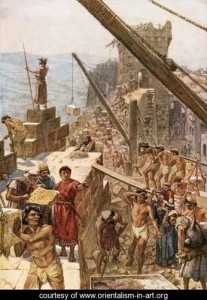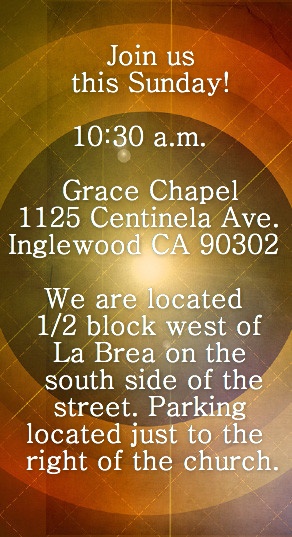I was going through my archives, and came across this article I penned 11 years ago. I think it speaks to us today, as we are striving as a congregation to move forward, to grow, and to build.
Many of you shared with me an overwhelming sense of joy as we together beheld the demolition of the infamous Centinela Motel. It was a big day for us all, and a turning point in the life of our church. My excitement was not based on the fact that I delight in destruction, but was grounded in the reality that the removal of the old is necessary for the emergence of the new. Observing the workers wield their wrecking bars and swing their sledgehammers gave me pause to think about the contrast between the processes of building and demolition. The result was that I arrived at a newfound appreciation for builders. Please don’t misunderstand me. I deeply appreciate our wrecking crew, for they performed a valuable service. It’s just that I have a deep sense of admiration for those who are able to envision, to plan and to build, for it takes a much greater level of skill, sophistication, patience, perseverance and creativity to build than it does to tear down.
Our nation has recently endured the trauma of Sept. 11. Through wanton acts of destruction, a team of dedicated extremists destroyed what had taken years to build. We all watched in horror as what took millions of dollars and untold time, energy and effort to construct was leveled in a matter of minutes. We watched Rudy Giuliani, the mayor of New York City, who had suffered in recent months through divorce, scandal, and physical illness, rise to the occasion and lead not only his city but the nation in the rebuilding of hope, courage, and resolve in the face of what could have been demoralizing and debilitating tragedy.
In a letter to the editor of Time Magazine in support of Time’s selection of Giuliani as “Man of the Year,” Anil Teneja made this observation: It is easier to orchestrate an act of terror than to inspire a grieving nation.1 I was deeply moved by the writer’s comment, and challenged with this thought: How much more are we, as people of God, called to build, to inspire and to encourage? I’m convinced that we’re called to be those who build, rather than those who tear down.
Have you ever noticed that most of the great personalities in scripture were builders? Abraham, Moses, David, Solomon, Ezra, and Nehemiah readily come to mind as those whose primary vocation was to build or rebuild according to God’s blueprint. Even Jesus said, “I will build my church.”2
I can only think of one demolition contractor in scripture. Jesus calls him in one place “the thief,” but he is alluded to or mentioned by other titles and designations throughout the whole of scripture. Jesus said that “the thief” comes to kill, steal and destroy.3 And it seems that when other individuals find themselves engaging in the demolition trade, breaking stuff up, tearing stuff down, or otherwise wreaking havoc, they are employed, either knowingly but often unknowingly, by the master demolition contractor of the universe. Thank God his license will soon expire! Since Jesus came to destroy the works of the Devil, his destructive work will ultimately itself be demolished.
A good question to ask ourselves as we consider the kind of lives we would live and the kind of persons God is making of us is this: Do we want to be builders or destroyers? Do we want to discourage or encourage others? Do we want to build others up in the faith or tear them down? Will we build our families and our churches up, or will we, through our own lack of character and our unbridled tongues, systematically tear down what God is trying to build up around us? Do we want to wield a sledgehammer or a trowel?
I suppose one of the reasons Nehemiah is among my favorite Older Testament heroes is precisely because he was a builder, a man who saw a need, allowed God to give him a vision, and went to work rebuilding what had previously been torn down. There were those who sought with words to demolish his resolve, destroy his vision, and interfere with his efforts. But Nehemiah was a builder to his heart. His undaunted enthusiasm is evident in his reply to his detractors:
The God of heaven will give us success. We his servants will start rebuilding. . . .4
Nehemiah recognized the power and presence of the Great Builder of the Universe, who places within our spirits the vision, the passion and the strength to build for His glory.
In the New Testament, the Apostle Paul reminds us that we are all builders in the sense that God has gifted each of us to build up one another. It’s as though Christ is the General Contractor, and we, through the use of our various giftings, are the subcontractors. We all have different abilities and functions, but we are all engaged in the common work of building each other in Christ. Let’s make sure that we allow ourselves to become building blocks, not stumbling blocks!
Instead, speaking the truth in love, we will in all things grow up into him who is the Head, that is, Christ. From him the whole body, joined and held together by every supporting ligament, grows and builds itself up in love, as each part does its work.5
1Time Magazine, Jan. 28, 2002
2Matthew 16:18
3John 10:
4Nehemiah 2:20
5Ephesians 4:12-13



